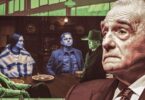List Of The 20 Best Comedy Movies of All Time
The Best Comedy Movies tend to tunnel into our brains like no other type of prevalent amusement. Through rehashed viewings and ear worm cites, they make oblivious layouts forever’s points of reference and stopovers — dating, street trips, the school understanding, marriage, the working scene — and help us to remember minutes in time and in addition whole times. They’re solace sustenance and treatment, high craftsmanship and social evaluate, settled affectionately in the midst of fart jokes and groin punches.
The best parody motion pictures additionally appreciate a flexibility that appears to be strange in most other media, with run-times that permit them to create entangled yet independent universes, the full smorgasbord of acting, altering, and melodic choices, and the (visit) R evaluations that give them the suitable scope of masterful movement. “Parody is subjective,” we’re always told. Possibly, yet in the event that something remains clever for quite a long time it’s unmistakably coming to crosswise over societies and settings to change our aggregate areolas which is as it should be.
Here are our picks for the Best Comedy Movies
- Office Space (1999)
Before Office Space, a great many people thought about Mike Judge’s coarse however insightful work by means of Beavis and Butthead, which just alluded to the multi-finished (if similarly man driven) perspective of Office Space. Luckily, a great many people can in a split second identify with this terrifyingly beige universe in which TPS reports, mind-desensitizing reiteration, and TGI Friday’s-style cooperation turn into the event for unobtrusively absurdist field notes on corporate subjugation. Select jokes, similar to David Herman (a.k.a. Michael Bolton) turning down his Scarface melody when a dark person walks around his auto, transform lethargic social pretending into cutting social analysis. Most have gotten to be a piece of the vocabulary. All have matured shockingly well.
- Clueless (1995)
Frequently expelled as a sweetened up time container of ’90s adolescent culture, Clueless is (as any genuine fan knows) an exemplary comic drama of conduct and social investigate roused by Jane Austen’s Emma. Give Heathers a chance to have the mind scarring and in-battling; Clueless takes ungainly, hormonal, status-fixated cooperations to brilliant levels through elevated exchange and a startling clearness of thoughts. A significant number of the best comedies need to ensure you’ve seen their dim underbellies, yet as Mean Girls and others have demonstrated, roar with laughter movies aren’t required to vibrate on a recurrence of toon viciousness and unobtrusive (or not) misogyny to make their imprints.
- Rushmore (1998)
Rushmore’s amusingness is the moderate cooked kind, inconspicuously spiced, however filling enough to warrant rehash visits. A million dismal sack high-schoolers, university fashionable people, and Holden Caulfields of any age were approved by its hopeless, self-fixated characters and expertly curated soundtrack. Wes Anderson’s second excursion additionally honed the craftsmanship heading and exchange from Bottle Rocket, however didn’t run bonkers with shading coordination and cutesy affectations (as with essentially everything he’s done from that point forward). It’s the missing connection amongst Harold and Maude and Scott Pilgrim versus the World, a particular transitioning motion picture that never truly needed to experience childhood in any case.
- Anchorman: The Legend of Ron Burgundy (2004)
The perfect throwing and science of Anchorman’s leads would be squandered without the flexibility to ad lib or, later, the agile altering that makes it such a strange, gutsy film. Adam McKay’s post-Saturday Night Live directorial make a big appearance expands on the punchy and foolish appeal of Will Ferrell’s hand over Old School, however dispatches with Todd Phillips’ garish character improvement. Contrasted with Anchorman, Old School and most different comedies by and large have a distressingly low jokes-per-minute check. Anchorman never tiptoes around an incredible set piece or adheres excessively near a straitjacketed script to satisfy an envisioned statistic. Like Ron Burgundy himself, it simply needs to be on you.
- Wayne’s World (1992)
Gracious, to see this film with crisp eyes. Mike Meyers and Dana Carvey’s finest true to life minute (and SNL adjustment) demonstrated so promptly compelling and re-watchable that few individuals mature enough to recall its discharge can marshal similar laughs nowadays. That shouldn’t detract from how skillfully executive Penelope Spheeris played with gathering of people desires, transforming illogical conclusions into running jokes and infusing the straight-confronted lunacy of improv and draw into an account, character-driven film. Just a single comic drama has ever shown improvement over Wayne’s World (see underneath), and even that can’t gloat characters as compassionate as Wayne Campbell and Garth Algar.
- Pee Wee’s Big Adventure (1985)
On the off chance that Pee Wee’s Big Adventure is the aftereffect of two or three exemplary weirdos (Paul Reubens and Tim Burton) holding over their common tastes — as a standup amigo of mine once put it — it’s a genuinely epic holding session. Obviously, the flawless craftsmanship course, cinematography, and exhibitions don’t hurt. In any case, the extent that street trip comedies go, few could face the scene-by-scene investigation that Pee Wee’s Big Adventure effectively does. Rehashed viewings just fortify how truly strange a character Pee Wee Herman is, or how misleadingly straightforward the film’s pacing stays up until its astonishment, Blazing Saddles-style meta-finishing. Generally, it’s a lesson in how irresistibly positive perspectives never leave style when rendered mindfully and slyly.
- Ghostbusters (1984)
Ivan Reitman, Dan Akroyd, and Harold Ramis made something genuinely extraordinary for the universe of Ghostbusters, which crackled with the silly, horny suggestions of past Ramis/Bill Murray extends yet discovered its balance in an undeniable, and exceptionally startling, Manhattan. Indeed, even children, over whose heads a large portion of the sex jokes flew, felt the power and nearness of Ghostbusters’ Big Apple, which held significant outcomes for our saints’ activities and inactions. That makes it all the more amazing how chief Reitman and his coolly splendid cast dig every circumstance for funniness, putting to disgrace the lion’s share of other ’80s science fiction/dream comedies (of which there were a strangely expansive sum, it ought to be noted). In spite of Egon’s recommendation despite what might be expected, check the streams paid off abundantly, drove in expansive part by Murray’s alluring hucksterism.
- Bringing Up Baby (1938)
It’s enticing to gathering lighthearted comedies of a specific age, particularly the mid 1930s through the ’40s, together regardless of the possibility that they don’t share a considerable measure of shallow qualities. Still, there’s genuine family relationship in the irresistible, quick fire exchange and class investigates of the screwball type, at any rate as rendered by experts like Frank Capra, Howard Hawks, Preston Sturges and others. Screwball comedies defused Depression-time strains and tensions, both outer and interior, and set the standard for witty repartee. Between It Happened One Night and its various, attractive posterity, it’s practically difficult to pick a conclusive case, however the script, acting, and incredibly deft pacing of Hawks’ Bringing Up Baby, which highlights overpowering exhibitions from Katherine Hepburn and Cary Grant, surrenders it a leg on almost all others. In spite of beginning reactions that it was excessively subsidiary and crazy, few movies, comedic or something else, have ended up being so heartlessly productive at beguiling first-time watchers.
- The Great Dictator (1940)
The political parody of The Great Dictator is established in immortal thoughts of one party rule and compliance, however its specific image is so all around characterized that it hoists Dictator above different cases of Charlie Chaplin’s physical virtuoso. It might impart a specific vaudevillian broadness to City Lights and Modern Times, however the way that it was made before the world knew the degree of different Nazi revulsions (Chaplin allegedly knew more than most, given his associations with Europe), just makes its third-demonstration claim for resistance more powerful. Chaplin’s depiction of Adenoid Hynkle (a Hitler personification) is as strong as his hapless Jewish-hair stylist character is influencing and sweet. “I generally considered you an Aryan,” a Tomanian (a.k.a. German) leader says to the hair stylist, who’s wearing a noose around his neck, going to be dangled from a light post by a gaggle of seig-heiling warriors. “I’m a vegan?” he offers compliantly. Buster Keaton may have gambled life and appendage more on the arrangement of 1926’s likewise basic The General, however here Chaplin utilized comic drama to go out on a limb on the world stage.
- Plane! (1980)
A modest bunch of movies turn out to be so fruitful they birth whole sub-types, and keeping in mind that Airplane! was absolutely the posterity of any number of wacky, cartoonish guardians, there’s never been a rascal like it, before or since. At first glance it’s a spoof of the (then) popular debacle film rage of the ’70s, yet any individual who has remembered its gymnastic discourse and savage pacing knows Jim Abrahams and the Zucker Brothers for all time raised the stakes on plays on words and sight chokes. The Farrelly Brothers may have changed the formula by dialing up the raunch and treacly sentimental subplots, and South Park’s Trey Parker and Matt Stone have comparatively inclined toward strange, all of a sudden visual stiflers blended with unashamed race, sexual orientation and religion taboos. Yet, as a hurricane of awesome silliness that tears the stuffing out of everything around it, Airplane! remains remarkably destroying.
- The Jerk (1979)
Finding a more affable lead than Steve Martin would have been unthinkable for this fish-out-of-water story, which was enlivened by a solitary line in Martin’s standup demonstration and follows Navin R. Johnson’s ascent from a poor “dark” tyke to a well off, inadvertent innovator — and back to the strict drain once more. Like Being There, the lead’s guiltlessness and effortlessness is stood out to incredible impact from the cool, hard world around him. Obvious science amongst Martin and Bernadette Peters hoists what could have been a coolly outlined romantic tale into something exemplary, honorable, and sweet. Martin is anxious to please in his first featuring part, never turning up his nose at a moronic piece of diversion. That isolates The Jerk from a considerable measure of the tormented, dirty stuff around it. Like a noiseless film (with fancy odds and ends) or a talkie that strolls (and bumbles, and collides with the ground), its center is the radiance peered toward confidence of The American Optimist. However dumb.
- Raising Arizona (1987)
Positioning this visual visit de-constrain over the more nuanced, patient, and reluctantly epic The Big Lebowski is extreme, since the last shows everything the Coen Brothers learned in the decade that isolates the two movies. In any case, it likewise fortifies how absolutely expert Raising Arizona was from the begin, its cracked interpretation of the American Dream dribbling with a disastrous and instinctive realness. Nicholas Cage gives a flinch prompting execution as a cheerful punching sack whose physical and psychic condition hums with consistent dangers, amazing abstract themes, poopy diapers, and unpleasant, misled companions and adversaries, and Holly Hunter candidly rules each scene she’s in. There’s not a line or look that doesn’t accomplish its maximum capacity, and much like Lebowski, it figures out how to make choking out stillness and active blasts of activity look like changed appendages of a similar smoke-recolored, lager swilling underdog.
- This Is Spinal Tap (1984)
Before Best in Show, or the daring, authentic ungainliness of Borat, there was Spinal Tap, the film that propelled many catchphrases and a modest bunch of splendid professions. Victimize Reiner’s nature to jump heedlessly into hard-shake platitudes was right on target, in spite of the fact that watching it now it’s difficult to trust this is a similar person who might later make When Harry Met Sally (a film that, to be reasonable, set its own particular elaborate layouts however did as such with far less roar with laughter minutes). Spinal Tap is splendid not on the grounds that it’s general, however you’d be unable to discover a comic drama or music devotee who didn’t love it, but since it accomplishes flawlessness in the moderately small lake it embarks to deplete. Imaginatively and as an industry, music has eaten up and pooed itself out a few circumstances over since Spinal Tap turned out, however this daddy of all mockumentaries consoles us there will dependably be a place for huge bottoms, love pumps, and anything that goes to 11.
- Caddyshack (1980)
You needn’t bother with a dark light to see the fingerprints of Caddyshack on endless contemporary troupe comedies. Be that as it may, in picking Caddyshack over its anarchic otherworldly brethren, for example, John Landis’ Animal House and Blues Brothers, or chief Harold Ramis’ nearly as-stellar Vacation, one must recognize the unmatched enthusiasm and fondness it appears for oddities, nonconformists, and pariahs of all stripes. Pick any scene in the film and you’re probably going to see a case of something Ramis and his cast and group either concocted or consummated in the domain of full length comic drama. Maybe it’s not astounding that lead author Brian Doyle-Murray construct it generally in light of genuine encounters, given how particular the vast majority of the circumstances feel. But on the other hand it’s a visit de-compel of improvisational filmmaking, as any Caddyshack buff can let you know, an approximately scripted songbird that advanced essentially as it was made. Chevy Chase, Bill Murray, and Rodney Dangerfield frame the heart of the film in all their lanky, juvenile transcendence, yet it remains a free, energetic, and living thing, and also the quintessential late ’70s/’80s comic drama, since it started as one.
- Annie Hall (1977)
Woody Allen’s New York is as affectionately rendered in Annie Hall as his Los Angeles is thin, vacuous, and dispensable, which makes it all the more noteworthy how well he and Diane Keaton ground the film in a baffled sentimental reality. Devotees of early Allen dreams like Bananas and Sleeper could hardly have anticipated the level of self-portraying sincerity he conveyed to Annie Hall, which basically set the beats and structure of the cutting edge, discourse driven lighthearted comedy. Allen’s depiction of the psychotic, existentially tormented humorist Alvy Singer bucks all presumptions about regardless of whether keen, brutally shrewd movies can make it in the cinematic world — or turn into the uncommon satire to win a Best Picture statuette. Similarly as with connections as a rule, we enthusiastically submit to its despairing right of passage every once in a while in light of the fact that it reminds us how delicate, impermanent, and exciting life can be. The distress! The pity! The mantras!
- Duck Soup (1933)
On the off chance that it wasn’t at that point clear that the Marx Brothers were a collaboration, their best film — the bonkers-by-any-standard Duck Soup — was neither composed nor coordinated by Groucho, Harpo, Chico, and Zeppo. That is normal for the day and age, however it’s more evidence that incredible exhibitions can possess a film. In the midst of agreement debate and instability with Paramount Pictures, the siblings figured out how to turn a semi political joke about the designed nation of Freedonia into the most reliable case of droll virtuoso and vaudeville-obliged schedules in film history. It doesn’t mind the shame of simply visual wealth, for example, Harpo’s mirror scene, or Harper and Chico collaborating to drive a lemonade sales representative nuts. The film’s subversive goes up against sex and the shades of malice (and incompetence) of war develop the crazy physicality in a way that additionally astounding Marx Brothers movies like Animal Crackers, Horse Feathers, and A Night at the Opera never could.
- Monty Python and the Holy Grail (1975)
A lot of Python fans will clench hand battle you over which draw or character is their top pick (and along these lines best), yet little question Holy Grail is the British outfit’s most naughtily motivated full-length excursion. Like Life of Brian and The Meaning of Life, both of which came after Holy Grail, it’s mostly worried with slathering Python’s overwhelming mind and strange thoughts over certainly Big-Picture points like mortality, the natural pride of the spirit, political suppression, and that’s just the beginning. Not at all like those movies, it has an earnestness conceived from its creation particulars (having been imagined between seasons 3 and 4 of their TV arrangement), a generally immaterial spending plan, and the way that the Pythons effectively interpreted their brave experimentation from TV to the wide screen. Like the Beatles ricocheting many tracks to vitally little measures of 4-track tape, this Arthurian tale is thickly stuffed with heavenly thoughts executed immaculately.
- Some Like It Hot (1959)
Before Tootsie, Mrs. Doubtfire or The Birdcage, Some Like It Hot mined a lot of pleasant amusingness from the universe of sexual orientation twisting, as the thoroughly diversion and delightfully combined Jack Lemmon and Tony Curtis demonstrated when they wore dresses, wigs, and thick cosmetics to get away from the swarm, quickly falling in with the officially popular stunner Marilyn Monroe. Some Like It Hot rests close to the highest point of executive Billy Wilder’s scary rundown of true to life triumphs generally due to its meticulous specialty, which amplifies each edge, line of exchange, and second of the watcher’s consideration. Add to that three of the most notorious, attractive, nice (on screen, in any case) identities of twentieth century Hollywood, a flawlessly high contrast look that evaded the colorization pattern of the late 1950s, and — goodness no doubt — split comedic timing and truly amazing circumstances, and you’re left with a standout amongst the most abundant, interminably watchable movies in the English dialect.
- Dr. Strangelove (Or How I Learned to Stop Worrying and Love the Bomb) (1964)
Stanley Kubrick’s dark funniness is clear in all his best work, however this Cold War showstopper indicates what happens while gnawing political parody slams headlong into an extremely sharp script (adjusted from Peter George’s Red Alert, with his help) and ostensibly the most conscientious comedic acting in film history. Subside Sellers is (still) a scene-taking disclosure as various, similarly ridiculous characters, especially the film’s ex-Nazi namesake. Sterling Hayden’s General Ripper and his fixation on valuable organic liquids still seems to be valid and noisy on such a variety of levels, as does the scorching critique on worldwide brinksmanship that could have been composed a year ago rather than a half century back. As provocative as it is typical, it’s a standout amongst the most outwardly and tonally powerful comedies ever in light of the fact that it buckles down for every single snicker it gets, and expect nothing of the watcher aside from a mind and a comical inclination.
- Blazing Saddles (1974)
It isn’t so much that Blazing Saddles shows at least a bit of kindness. In the event that anything, the master droll and loopy exchange disguises a horrendous scorn of frauds and power-trippers of each sort. Its scorching marking iron stores feel sorry for nobody. It’s that notwithstanding when it’s their expressed aim or aspiration, most movies neglect to depict persisting truths about race, sexual orientation, tribalism, governmental issues, kinship, and shotgun impacts of open air fire fart with a tenth of the guts or wonderfulness of Mel Brooks’ best motion picture. Notwithstanding calling it that is stating a great deal, considering this is the person who made The Producers and Young Frankenstein. Yet, as each motion picture that has been discharged since Blazing Saddles has demonstrated, it’s not just the quintessential Western satire, or the quintessential comic drama about America in every one of her inconsistencies, failings, and triumphs. It’s the quintessential shot comic drama in light of the fact that every little thing about it reverberated on its first trip, and keeps on resounding on each progressive go-round. There’s staggering assortment in the written work (affability of Brooks, Richard Pryor, Gene Wilder and others) and a supernatural quality to the guaranteed exhibitions, a far-leader of-its-time foreknowledge in the topic, and an obscenity that sounds stunning anyplace, whenever. Perhaps this is on account of regardless we’re battling with similar issues today as we were in 1974, or 1874. Possibly this is on account of it’s a film about the very way of movies, a retribution of the untruths Westerns let us know. It’s all that it can and ought to be. As Harvey Korman’s Hedley Lamarr says at a certain point, “My brain is a seething deluge, overflowed with rivulets of thought falling into a waterfall of innovative options.” To which Slim Pickens’ Taggart answers, “God darn it, Mr. Lamarr, you utilize your tongue prettier than a twenty dollar prostitute.”








Leave a Comment